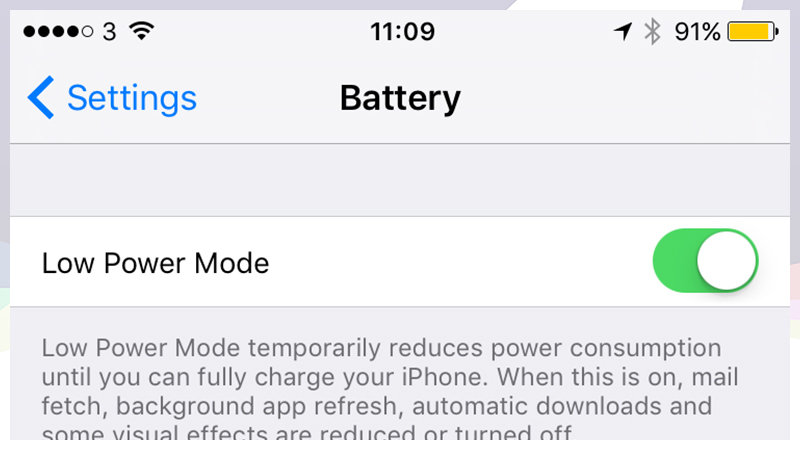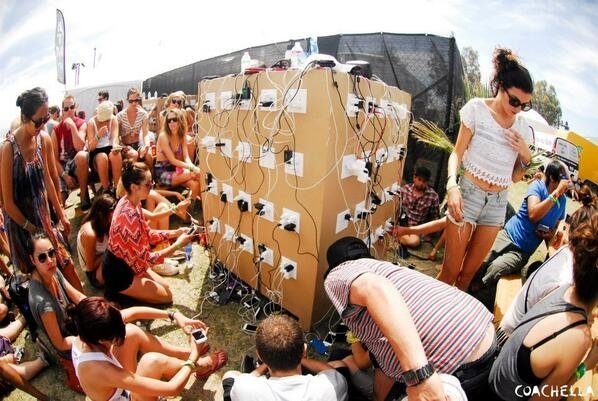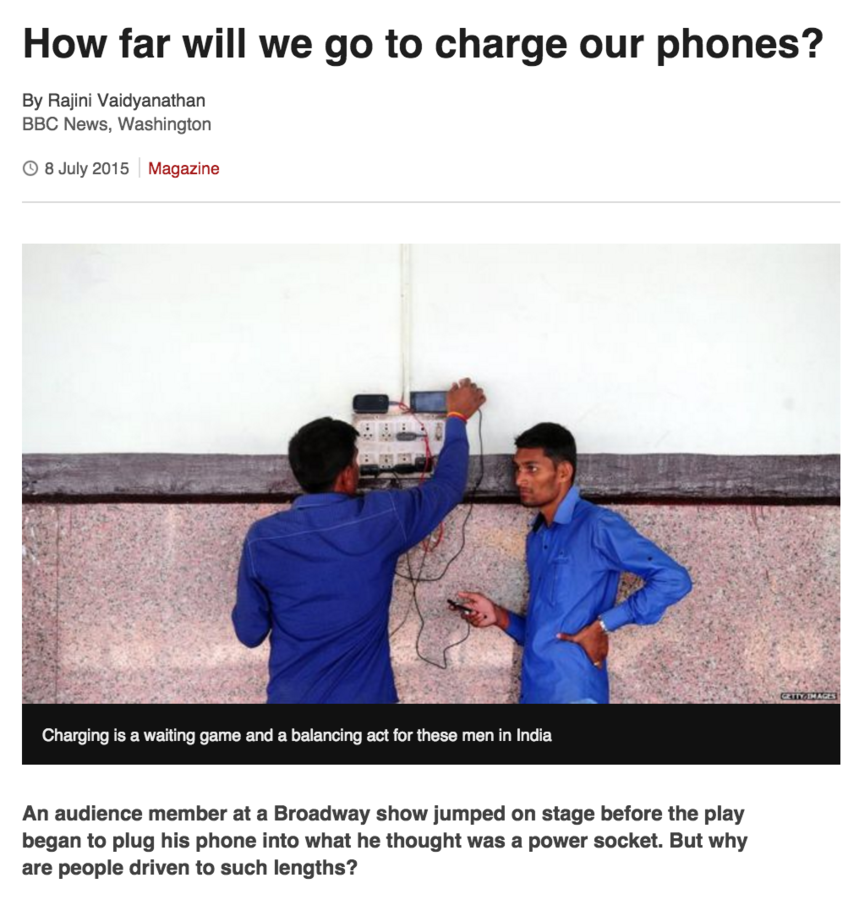CHARGING ANXIETY
A digital story exploring the unease generated by a decreasing battery

Engaging with individuals in the community to discover how
battery influences behaviour away from a domestic environment.
BY KATE SCOTT
"Have you ever felt that sudden, intense dread that you're about to die? That in less than seven minutes, the know of fear and anxiety unspooling at speed will swallow you whole, rendering your life bland and your existence meaningless? And all because you failed to prepare!"
(The Guardian 2015)
At some stage we've all been there away from a power source for too long, and with a battery depleting fast. Think typically of the device you use as a main source of communication. In contemporary society, most people will engage with either their laptop or phone, however it's hard to ignore the abundance of other devices that we heavily rely on.
When considering the CICSO's survey where 9 out of 10 Generation Y occupants admit to suffering the phenomenon of "nomophobia" (the fear of having no mobile phone), I believe that due to the evolution of technology we have become a world reliant on the devices and the ability for their battery to last, and due to their convenience they are almost attached to us at all times of the day.
ABOUT
My aim within this digital story is to discover what extents and situations individuals have found themselves in due to a depleting battery, and how anxious it really makes them. While keeping in mind the article Dead-battery anxiety? Learn to live without your phone by Nosheen Iqbal (2015), I hope to alter my findings to discover the exact moment where individuals begin to feel anxious, how they manage this outside their domestic locations (such as on campus, work or travelling), what lengths these individuals will go to in order to obtain a charger and if they've ever found themselves in a critical situation without battery or any source of power.
AIM

MY STORY
Personally owning an almost outdated iPhone I know one of my highest concerns away from home is "what happens if my battery dies?" After going to the Apple store to discuss the issues of a quickly depleting battery that has the tendency to jump from 26% to 5% the answer they simply gave me was "your battery health is very good, especially considering it's had over 650 charges." So simply, batteries are made to become outdated, and not made to last a lifetime almost in order to encourage a consumer to purchase a new one.
Although with Apple's latest operating system update known as IOS 9 they have introduced a 'low power mode' in order to increase the efficiency and extend battery life, and can go even further by manually enabling this option. It is automatically prompted when a phone reaches either 20% or 10% in order to reduce power consumption by turning off certain features.
BATTERY PERCENTAGE
Through conducting primary research one of my main focal points was at what percentage of a device battery does an individual begin to feel anxious.
Melissa, in her response to a survey I conducted, stated that she feels anxious when her battery reaches 40% if she's out (e.g. at a club) and feels safer with her phone in her possession. At home, about 10% because it means she has to get the charger if she wants to continue using her phone.
Nicholas stated that he begins to feel anxious as his phone battery reaches 75% to 50% but on the other hand, Rachel stated "the battery of technology does not make me feel anxious."
Within the duration of my research I looked at the media platform of twitter, and discovered many tweets where users have admitted to suffering battery anxiety. Below are some of these findings.




But with the increasing consumption of technology and media within society is it any surprise that the majority of us suffer from this or have felt discomfort simply by the changing colour or number of the battery icon? Intrigued by what percentage individuals begin to feel anxious, twitter provided unease of some users as a battery reaches 1% and others as high at 99%.
#BATTERYANXIETY
LOCATION AS A CONSTRAINT
"Your phone battery hovers in the red zone and your brain hits auto-twitch,
scanning the immediate vicinity for power."
(The Guardian 2015)

People gather around a charging station at Coachella Music Festival (Bierman 2015)
It is interesting to see how people position themselves in a public space, depending on where the closest power outlet is (Bowley 2015), and by asking individuals how they manage situations like this when travelling, working or at university. Some of the responses included:
- "At uni I am able to charge at points around the library and in the classrooms. At work I can charge it in the staff room or nursing station." - Rachel
- "I charge it in my car on the way there and/or home, take my charger with me and charge it at the location, or charge it beforehand" - Melissa
- "I always bring a charger with me and try to position myself in the room/environment so I am close to a power outlet." - Jack

But what is it that terrifies us about our batteries going flat? I suppose individuals endure different experiences, and the reasons behind these differentiate.
But what is really eye-opening is the extremes individuals go to in order to maintain a sufficiently charged battery.
For example an audience member of a Broadway show jumped onto the stage before the play begun as his phone dropped below 5%, but what he thought was a power socket ended up being fake (Vaidyanathan 2015).
HOW FAR WILL WE GO?
"The best (or worst, depending on how dependent you are on your mobile) remains an as-yet unnamed woman filmed on public transport in Hong Kong dealing with her dead phone by screaming and crying for help...
Is that really what the world today has come to, are we really that reliant on the battery life of our devices? I therefore decided to interview a few individuals in the community around me in regards to the lengths they have gone in order to obtain a charger.
She's hysterically inconsolable.
Her phone remains dead, her dignity buried"
(The Guardian 2015)
One of the respondents Katelyn stated:
And with other individuals such as Nicholas going to extremes just to be able to use a phone in the space they desire discussing the way he
One of the most significant findings caused within a university environment is the concept of borrowing chargers from other students, which I'm definitely a culprit of.
"Once, I skipped class to sit in the smoko area with a random dude so I could use his charger to charge my phone (I don't even smoke)."
"Ran a charger to charge my portable charger then to charge a phone off that, mainly to reach a table to use the phone"
After connecting with the extent an individual would go to obtain a charger, I began to question why? Do we feel anxious that we might miss something? What was to happen if we lose power at a critical moment? By asking individuals if they've ever lost power at a critical moment, some of the responses were as follows.
Melissa was highly engaged with an experience she endured when her phone died and she was out camping with her friends, although luckily her friend had a charger she was able to use in her car. "We were out camping at a non-powered site about 5 hours away from home and I got really sick had to call Mum to let her know I needed her to come and get me, or my Uncle nearby. If I didn't have my phone I would've got worse and vomited for a few days on a non-powered site with no fresh water. We also had to call an ambulance at one point on that trip so thankfully we were able to charge our phones. If we had lost power at either one of these points it would've been really stressful."
CRITICAL MOMENTS
Myfanwy stated
Gemima also recognised herself in a similar situation, she discussed her experience of being in an
unfamiliar environment.
"Yes, I needed a taxi home and didn't have enough money in my bank, so had to transfer money online but my phone battery ran out before I could get the money."
"I was meeting a friend in Melbourne where I've never been to, and lost battery just after she said text me when you get off the train. Lucky it was a small station and I walked about for half hour or so before I bumped into her."
Although the two responses I felt as though I personally could relate to, and believe many others would have been in similar situations included those of Katelyn and Bel.
Katelyn spoke of a recent experience and stated
Bel's response was similar but in the context of travel she felt the critical moment occurred as she engaged saying
"Literally 3 days ago I ran out of battery while I had maps on getting home from Terrigal"
"When travelling, phone dying while looking for an address / needing to make a call "
By investigating different media spaces it is evident that audience and place largely influence the way individuals perceive the media, and the way they interact with the technology that consumes them. By observing members of the community and their anxiousness generated from a devices decreasing battery percentage it is clear that the concept of space, from domestic and home locations to those of work, university and travelling, have a significant impact on the way individuals react and respond to critical situations.
FINDINGS
Bierman, B 2015, 5 Things No One Tells You About Coachella, Her Campus, viewed 27 October 2015, <http://www.hercampus.com/school/chapman/5-things-no-one-tells-you-about-coachella>.
Bowley, J 2015, Power Anxiety: The Stuggle Is Real, Wordpress, viewed 29 October 2015, <https://jarrahbowley.wordpress.com/2015/10/04/power-anxiety-the-struggle-is-real/>.
Brait, E 2015, ‘Man who jumped on Broadway stage comes forward: ‘I saw the outlet and ran’’, The Guardian, 11 July, viewed 27 October 2015, <http://www.theguardian.com/stage/2015/jul/10/man-who-jumped-broadway-stage-juice-jackal>
Iqbal, N 2015, ‘Dead-battery anxiety? Learn to live without your phone’, The Guardian, 15 July, viewed 27 October 2015, <http://www.theguardian.com/commentisfree/2015/jul/14/mobile-phone-battery-anxiety>.
REFERENCES
Maddi 2015, 'It gives me anxiety...', jacobsdaffodil, Twitter , 11 October, viewed 29 October 2015, <https://twitter.com/jacobsdaffodil/status/6533316974928228352>.
Mafiosa 2015, 'It gives me anxiety...', mafiosa, Twitter , 28 October, viewed 29 October 2015, <https://twitter.com/mafiosa/status/659441095760216065>.
Seto, T 2015, 'battery anxiety is when...', tuxesto, Twitter, 27 October, viewed 29 October 2015, <https://twitter.com/tuxseto/status/659158454725136384>.
Vaidyanathan, R 2015, ‘How far will we go to change our phones?’, BBC News, 8 July, viewed 26 October 2015, <http://www.bbc.com/news/magazine-33295211>.
CHARGING ANXIETY
By Kate Scott
CHARGING ANXIETY
- 443

